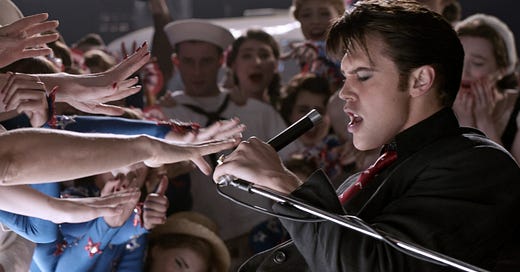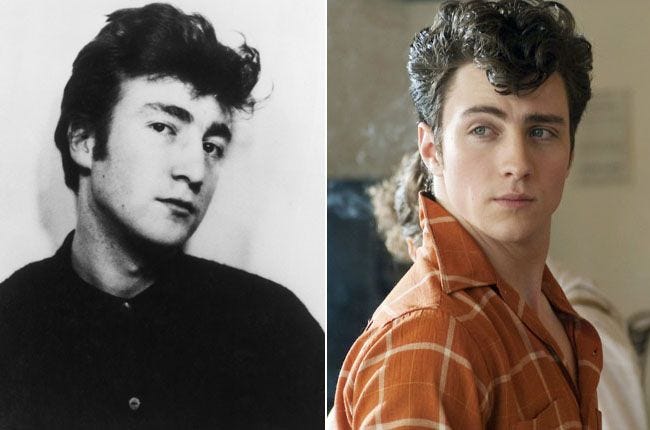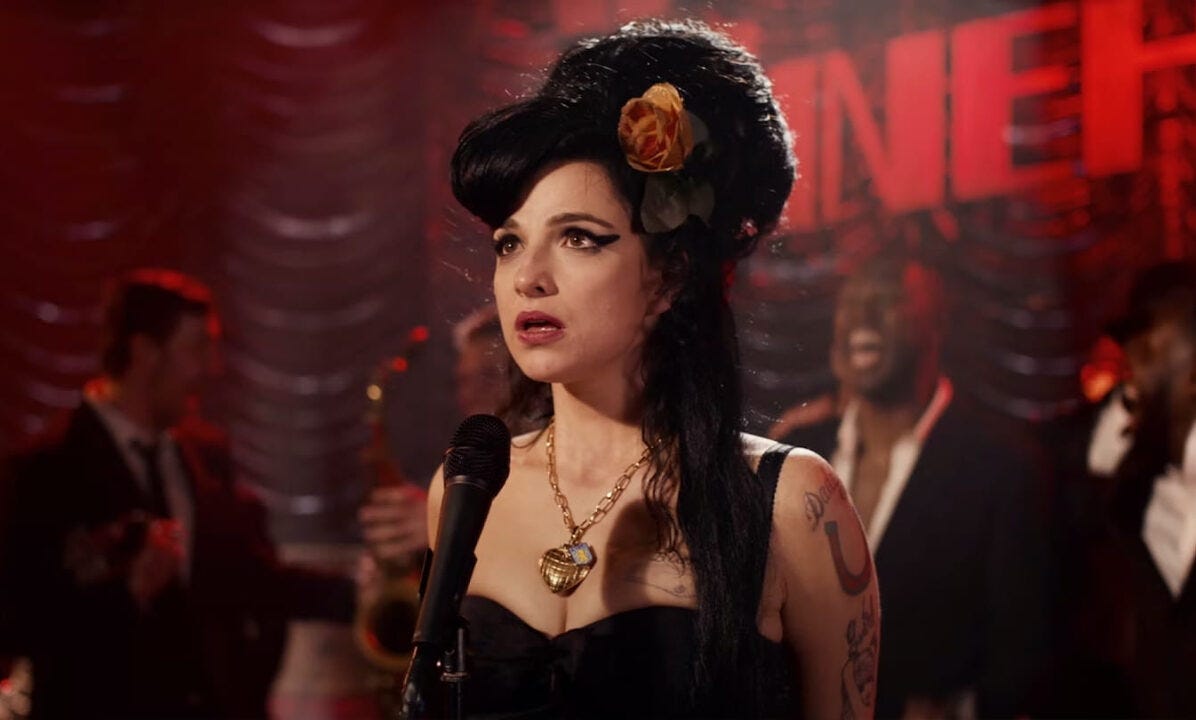Trigger Warning: small mentions of sexual assault, suicide, mental health issues
I sat down and began watching Nowhere Boy (2009) a few months ago with my dad. A biographical British film detailing John Lennon’s complex family life, difficult teenage years and what would soon evolve into The Beetles we know now, I began to google what a young John Lennon actually looked like. Turns out, not much resemblance of the actor Aaron Taylor-Johnson who was playing him, the two not even sharing the same eye colour.
Asking my dad what he thought of this, he replied ‘he doesn’t have to look like John Lennon, it is just his story’, which at first I found hard to accept considering this was a film about John Lennon, targeted towards people who like John Lennon. I know if I was a fan, this would be something I would have in mind. However, this also sparked questions in my mind when I was thinking about other biopics I had seen of how much creative liberty should be allowed in these types of films, and how much accuracy should we expect from a film about someone’s real and lived life?
The attempted goal of a biographical picture is fairly straightforward; telling a story of a significant figure within history, whilst emphasising the importance of their contributions that we know them for and highlighting the background history which influenced them to be who they are. There is a general expectation that some aspects of the story will either be dramatised or consolidated, run time hindering a full exploration of the person. However, I think there is a distinct difference in this genre between bringing a story to screen while simply raising the stakes or making changes out of respect, and completely twisting a narrative, relegating issues that need to be addressed with this person to the sidelines.
The latter was my main issue with Baz Luhrman’s 2022 biopic Elvis. Objectively speaking, this film has some fantastic qualities and I will give it it’s flowers; spectacular editing, Austin Butler being a perfect Elvis and the interesting ways Luhrman chose to showcase the movement of time. If I wasn’t aware of the actuality behind the film, I would respect it a lot more.
Elvis Presley met his only wife throughout his lifetime, Priscilla, in Germany, when he was 24 and she was 14 years old. Would you be able to understand this from the film if you didn’t know that prior? I don’t believe so. It is purely a sweet and simple interaction, juxtaposing the misery of being forced into the army, and not the truth of one of his friends inviting a little girl to one of Elvis’ parties and them developing a co-dependent and oddly serious relationship for her age and his.
The Presley Estate don’t easily allow films to license Elvis’ music, yet also offered the film-makers resources and special considerations, like allowing Austin Butler into Elvis’ bedroom at Graceland; his private space which he only allowed Priscilla into, and also the site of his death. The Presley family took Butler in with open arms, developing a friendship, which insinuates a sense of bias or influence over how the film was going to end up. Not mentioning this concerning age gap? It seems quite intentional to me, especially due to this film not just purely targeting the generations that would have grown up with him. My 80 year old Grandma hobbled to the cinema to go watch this when it came out originally, and I don’t believe the producers put in a Doja Cat song for her, nor do I think that would have influenced her feelings towards the film like it did mine.
In my mind, there are a few other reasons why this element of Elvis could have been erased:
To avoid the main conversation around the film being around something bad about Elvis: We all are aware of how when the media latches onto something and how that can snowball, a great example recently being with the It Ends With Us cast drama. Whilst that was, in reality, extremely unimportant, it dictated how people felt about the film before even watching, and I’m sure the producers wanted to prevent that.
To fulfil this very uniform good vs evil ideal they were going for between the Colonel and Elvis: There is no doubt in my mind that the Colonel was awful real in life. He is presented as the embodiment of the worst of corporate, capitalist America, his exploitative business practices being a catalyst for some things that go wrong in Elvis’ life. However, I feel like it also isn’t as simple as Elvis was good, Colonel was bad. We see certain things that Elvis does that are awful (his cheating even in front of Priscilla, his drug use, his anger and more), yet they all lead back to something the Colonel said or did. What you can’t pin on him is dating a 14 year old at 24, moving her thousands of miles away from her family, trying to sexually assault her when she wanted to leave him and destroying her sense of self. None of that fits into this Colonel is evil, Elvis is the hero nonsense that the producers are trying to achieve. When making a film about Elvis, I think the script deserves more nuance then that.
However, as I said, not every single biopic removing pieces of narrative is trying to push something important aside. The Iron Claw (2023) is a great example of this, detailing the stories of the wrestling Von Erich brothers and how they each all passed, except Kevin Von Erich. This film totally destroyed me in the cinema; I’ve never bawled so hard. Yet, I go googling once again and find that the film actually removed a brother, being even more tragic in real life.
Chris Von Erich was the youngest sibling of the family, who, unlike Mike, was desperate to wrestle. However, he was inflicted with several health-related setbacks, including asthma and brittle bones.
By age 21, Chris became incredibly frustrated at the stagnation of his career, further struggling with the suicide of his brother Mike which happened not long before. Just a few days shy of his 22nd birthday, Chris took his life, despite assuring his brother Kevin earlier that day that he wouldn’t.
Whilst I find it a shame that we couldn’t have seen every single brother in the film, the director told the press that they cut him for thematic and pacing purposes, also believing that with the inclusion of another death, the movie would never get made due to the amount of tragedy. The Von Erich family respect this decision, and Chris is never ignored, nor is the inaccuracy of the story. Whilst Elvis goes for pure glamorisation of the rockstar lifestyle, The Iron Claw makes an effort to show the brutality and misery the Von Erichs faced, constantly reminding the audience that these are very much real people.
The biopic most infamous for being ridiculously inaccurate is of course, Bohemian Rhapsody, the Freddie Mercury biopic. Despite however much I adore this film, this is a perfect example of taking however much creative liberty it wants. The film-makers took the lyric ‘Is this the real life? Is this just fantasy?’ far too seriously.
One of the major criticisms this film gets is for jumping around in time far too much. Their rise to popularity looks meteoric and effortless, becoming renowned and known world-wide extremely quickly into the film. Alike to Elvis, this film is purely for entertainment and is impressively stylistic, giving you textbook heroes and villains. However, I prefer Bohemian Rhapsody because there is an underlying support for women that you will not be able to find in the other.
An example of a biopic that takes far too much creative liberty and is incredibly inaccurate to real life is Back to Black (2024), also directed by Sam Taylor-Johnson, the filmmaker behind Nowhere Boy. This film embodies the worst tendencies of the biopic genre; heavy-handed storytelling, selective omissions, and, on top of that, poor directing.
Amy Winehouse’s life is undeniably complex, marked by a whirlwind of fame, substance abuse, and personal struggles like depression and bulimia. Her story, in the right hands, could have been an honest, respectful tribute that acknowledged both her talent and her battles. Initially, I had hope when I learned that Taylor-Johnson had once been a fan, having seen Winehouse perform live. But as it turns out, being a fan doesn’t necessarily make you the right person to tell someone's story, especially when the nuance and depth of her experience are ignored.
One of the most glaring issues with Back to Black is how Amy is reduced to a lovesick teenager, a portrayal that does a disservice to her artistry. The film speeds through the creation of her iconic Back to Black album, failing to explore the emotional weight and personal turmoil that shaped the music. More disturbingly, the film omits crucial details about her life, including the toxic influence of her father, who had a deeply negative impact on her well-being. It glosses over key moments, such as her being forced to perform just days before her death, and instead places undue emphasis on her relationship with Blake Fielder-Civil, implying that heartbreak over him played a significant role in her demise. This reductionist narrative, which implies that her death was largely caused by a failed relationship, feels not only misleading but disrespectful to the struggles she faced with addiction and her mental health.
While some people were highly critical of the casting choices, that wasn’t my main concern. What bothered me most was the way the film sanitised and misrepresented the events leading up to Amy’s tragic death. By simplifying her story and erasing uncomfortable truths, Back to Black turns a complex, multifaceted woman into a caricature of heartbreak, missing the opportunity to meaningfully reflect on her life and legacy. This kind of narrative, whether intentional or not, harms the viewer’s understanding of Amy Winehouse as a person and as an artist, stripping away the darker realities that need to be acknowledged.
In reflecting on biopics like Elvis and The Iron Claw, it’s clear that the balance between creative liberty and accuracy can deeply impact how we view real-life figures. Films like Elvis can gloss over problematic aspects of a person's life, potentially altering public perception for the sake of a more favourable narrative. In contrast, The Iron Claw shows that while some omissions are made for narrative flow, they can still maintain respect for the real story. Ultimately, the tension between storytelling and authenticity in biopics is something viewers must navigate carefully.
Audience media literacy plays a crucial role in how we consume biopics and interpret the stories they tell. Many viewers, especially when watching films about beloved public figures, may not question the authenticity of the portrayals, assuming the events presented are true to life. This can lead to skewed perceptions of historical figures and their legacies, as audiences may unknowingly accept a glamorised or incomplete version of reality. To combat this, it’s essential for us as viewers to engage critically with the content, researching the true stories behind the films they watch and recognising where dramatisation may have been taken. By fostering a more informed audience, we can hold filmmakers accountable for how they handle real-life narratives and prevent biopics from becoming the definitive version of history without question.
Thank you for reading! If you enjoyed this post, you may enjoy:












This was such an amazing piece! As much as I love 'Elvis,' I totally agree with you on how it strives for a particular narrative that is not the whole truth of who Elvis was. That's why I was grateful 'Priscilla' came out last year to offer a bit of a balance between the two (although, that film had similar problems you listed in your article). The messages biopics try to communicate with audiences never quite land right, and I hope more of them start to become aware of these issues because then maybe they will be taken a bit more seriously lol.